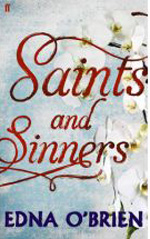

Faber and Faber, paperback, 9780571270316
Exile can be defined as the enforced or self-imposed departure from your native country for a period of time, maybe forever; think of Romeo's banishment from Verona, or Napoleon's exile to Elba. Edna O'Brien has been in self-imposed exile in London since the 1950s following her estrangement from her parents and marriage to a writer. In 1961 her debut novel, The Country Girls, was banned and burnt in Ireland.
I have to confess that before Saints and Sinners I had never read a word by Edna O'Brien, and I have found her to be a revelation, a fresh voice to me.
In Saints and Sinners, a collection of short stories, O'Brien has chosen to return to the theme of exile. She recently identified in an interview that there are two types of exile: physical exile from a place or person, and exile of the soul (The Book Show, "In Interview with Mariella Frostrup," February 2011). Through these fantastic short stories, she explores repeatedly the longing, nostalgia, the contradictions and also the hardships of Irish life.
In "The Shovel Kings", O'Brien details the lives of Irishmen who emigrated to England to find work, and who dug up the roads to lay electric cables. Rafferty, a retired labourer, a man of indeterminate age upon whom a "permanent frost had settled", recounts the days of shovelling, singing and camaraderie for which he longs. Rafferty is truly dispossessed, abandoned by his violent father in London, unable to return to his mother in Ireland, "a man who doesn't belong in England and ditto Ireland", who self imposes his exile from others, "not from a hardness of heart but from a heart that was immeasurably broken".
O'Brien's language is vivid, sometimes breathtaking; in "Two Mothers", the narrator describes her Mother's eyes: "blue-blue eyes that held within them an infinite capacity for stricture. To chastise one she did not have to speak—her eyes did it with a piercing gaze. But when she approved of something, everything seemed to soften and the gaze, intensely blue, was like seeing a stained-glass window melt".
Still, O'Brien creates characters that are fallible, sometimes unlikeable, or prying, vindictive or lonely; in "Sinners", the landlady of a bed and breakfast establishment disapproves of a couple and young woman, who are secretly lovers, making no comment except to try to charge them for one room rather than two the following day. Who are the Saints and who are the Sinners? Perhaps the point is that no one is exclusively bad or good.
Very occasionally, I read a book that provokes self-reflection for days. In the case of Saints
and Sinners, I am still asking myself whether I make choices that exile myself from
the world. As a new reader of Edna O'Brien I found this short story collection spellbinding,
swaying my attitude to life. I cannot recommend Saints and Sinners highly enough to
potential readers.
